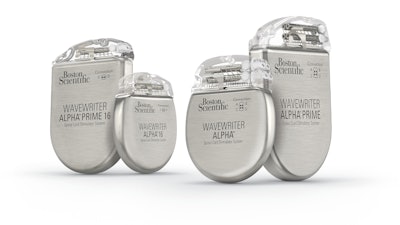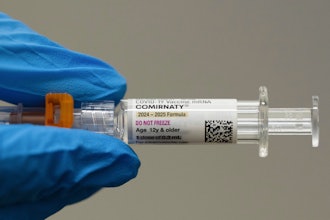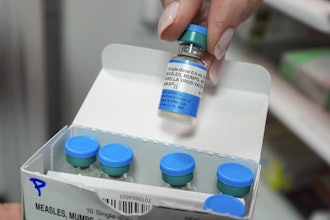
Boston Scientific, a biotech engineering firm and medical device manufacturer based in Massachusetts, is continuing to expand the scope of its pain treatment portfolio in search of alternatives to opioids.
The FDA recently approved an expanded indication for the company’s WaveWriter Alpha Spinal Cord Stimulator (SCS) Systems for the treatment of painful diabetic peripheral neuropathy (DPN), a complication of diabetes that can affect the lower extremities of the body.
In addition to Boston Scientific’s flagship WaveWriter, the company’s radiofrequency ablation platform serves the needs of spinal pain, and its Superion Indirect Decompression System serves those affected by moderate spinal stenosis. Nilesh Patel, vice president of medical affairs at Boston Scientific, said the recent acquisition of Relievant Medsystems, a company specializing in the diagnosis and treatment of vertebrogenic pain, supports his company’s existing portfolio of interventional pain therapies and can help shape the future of chronic pain care for millions of patients.
Medical Design & Development recently spoke with Patel about the process behind expanding indications for the WaveWriter, what’s next for the platform and the importance of pain treatment options outside of opioids.
MDD: Were any design changes necessary for getting approval for the WaveWriter Alpha to treat diabetic peripheral neuropathy?
Nilesh Patel: No design changes were needed to the system as this label expansion has been granted based on clinical evidence, including real-world data that demonstrates the safety and effectiveness of the Boston Scientific SCS systems. The clinical evidence is based on a systematic review of published clinical scientific literature of commercially available SCS systems and primary evidence comes from two randomized controlled trials in patients with painful diabetic peripheral neuropathy (PDPN). Additional clinical evidence for safety was obtained from a cohort of DPN patients identified in the Boston Scientific RELIEF Study, and a prospective registry who were treated for chronic pain due to diabetic peripheral neuropathy.
MDD: Is Boston Scientific working with the FDA on any further indications for the implant?
Patel: At Boston Scientific, we recognize the impact innovative and effective therapies can make for people living with chronic pain. As with all our technologies, we continuously research ways to evolve and advance our therapies to provide clinically differentiated options to physicians and the patients they serve.
MDD: How important is it to have more non-opioid options for treating chronic pain?
Patel: Because the current approach to pain management is insufficient, many have advocated for the increased use of opioids. Today, one in four people who receive long-term opioid therapy in a primary care setting struggle with opioid addiction. The standard of care for chronic pain includes opioids and invasive surgeries, but medical devices have demonstrated significant pain relief as well as a reduced reliance on opioids. In fact, both the Department of Health and Human Services and the 2022 CDC Guidelines call for the use of interventional techniques so access to innovative and effective, non-opioid treatment options is essential for long-term pain relief and improved quality of life.






















